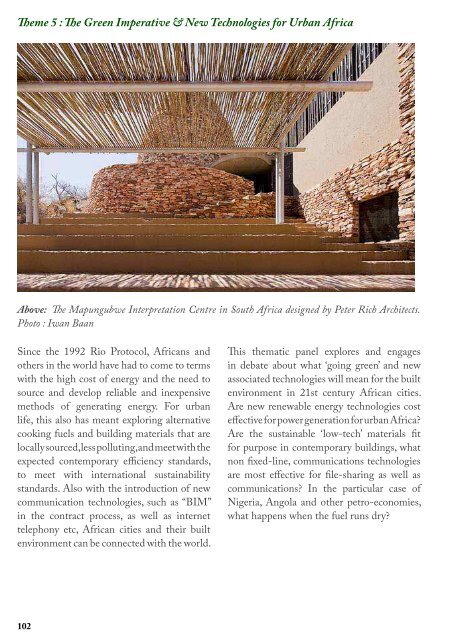ArchiAfrika-April-Magazine-English-final-v2
ArchiAfrika-April-Magazine-English-final-v2
ArchiAfrika-April-Magazine-English-final-v2
You also want an ePaper? Increase the reach of your titles
YUMPU automatically turns print PDFs into web optimized ePapers that Google loves.
Theme 5 : The Green Imperative & New Technologies for Urban Africa<br />
Above: The Mapungubwe Interpretation Centre in South Africa designed by Peter Rich Architects.<br />
Photo : Iwan Baan<br />
Since the 1992 Rio Protocol, Africans and<br />
others in the world have had to come to terms<br />
with the high cost of energy and the need to<br />
source and develop reliable and inexpensive<br />
methods of generating energy. For urban<br />
life, this also has meant exploring alternative<br />
cooking fuels and building materials that are<br />
locally sourced, less polluting, and meet with the<br />
expected contemporary efficiency standards,<br />
to meet with international sustainability<br />
standards. Also with the introduction of new<br />
communication technologies, such as “BIM”<br />
in the contract process, as well as internet<br />
telephony etc, African cities and their built<br />
environment can be connected with the world.<br />
This thematic panel explores and engages<br />
in debate about what ‘going green’ and new<br />
associated technologies will mean for the built<br />
environment in 21st century African cities.<br />
Are new renewable energy technologies cost<br />
effective for power generation for urban Africa?<br />
Are the sustainable ‘low-tech’ materials fit<br />
for purpose in contemporary buildings, what<br />
non fixed-line, communications technologies<br />
are most effective for file-sharing as well as<br />
communications? In the particular case of<br />
Nigeria, Angola and other petro-economies,<br />
what happens when the fuel runs dry?<br />
CALL<br />
for papers & proposals<br />
We invite you to send in 300-word abstract proposals for academic papers related to these thematic<br />
areas. The African Perspectives Scientific Committee will review all abstracts before selecting papers<br />
to be presented at the conference. Also invited are proposals for projects, cultural interventions, and<br />
other presentation media, associated with these themes, these will also be reviewed before selection.<br />
We particularly invite graduate student proposals on themes of interest, which will help us develop a<br />
student workshop, which will run in parallel to the event.<br />
We expect all proposals to be submitted digitally, by email. For presentation and performance proposals,<br />
please send a description of your proposal, with images where available that can be photographed or<br />
recorded, digitally so they can be sent online. Emails should only be sent to the address given below. A<br />
website for upload of material is being created which will be linked to the email.<br />
Your proposal must be received online by the deadline date 15 June 2013. You will be informed by 15<br />
July 2013, whether we have accepted your proposal. If your proposal is accepted, you will then be asked to<br />
revise this according to the guidelines set out by the reviewers and in the given conference format. If you<br />
intend to go ahead with a full presentation, we expect you to send the conference office confirmation that<br />
you intend to produce a full submission, to the conference on or before 15 August 2013. This confirmation<br />
should include your revised abstract or proposal, taking into account the scientific reviewers comments.<br />
Drafts of papers, artwork, videos and ‘works in progress’ of conference material, should be sent in for<br />
<strong>final</strong> review on or before 15 September 2013. Only work that has been reviewed at this stage will be<br />
eligible for <strong>final</strong> submission.<br />
All <strong>final</strong> conference submissions; papers, artwork, etc, must take place by 5 November 2013. Please note<br />
that work that has not been reviewed in September cannot be submitted in November.<br />
The Lagos 2013 Conference programme will be published prior to the conference, and include abstract<br />
information about all selected submissions; academic papers, artwork etc. After the conference the<br />
scientific committee intends to select the best papers presented to produce an academic online publication.<br />
102 103


